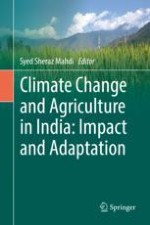2019 | OriginalPaper | Chapter
3. Simulating the Impact of Climate Change and its Variability on Agriculture
Authors : Naveen Kalra, Manoj Kumar
Published in: Climate Change and Agriculture in India: Impact and Adaptation
Publisher: Springer International Publishing
Activate our intelligent search to find suitable subject content or patents.
Select sections of text to find matching patents with Artificial Intelligence. powered by
Select sections of text to find additional relevant content using AI-assisted search. powered by
